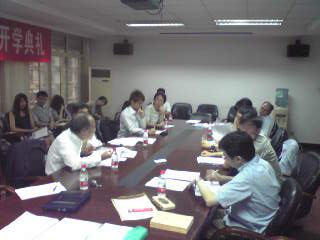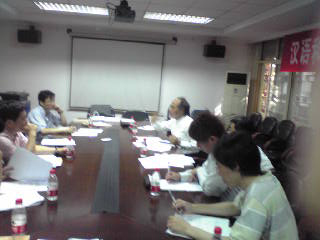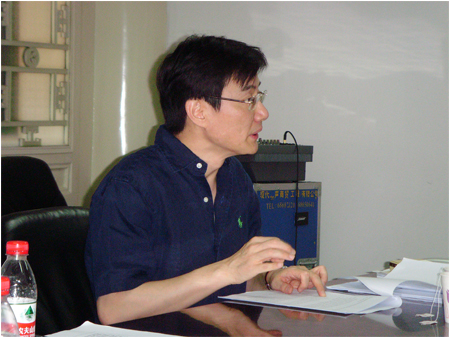[Report] International Center for Critical Theory (ICCT) Summer 2010 Workshop on “Rethinking Enlightenment in Global and Historical Contexts”
On August 25th and 26th, a group of members from UTCP and the University of Tokyo attended ICCT Workshop “Rethinking Enlightenment in Global and Historical Contexts,” which was held at Peking University in Beijing, China.
This workshop was co-organized by Prof. Zhang Xudong (NYU / Peking University) and Prof. Nakajima Takahiro (UTCP). It was second semiannual meeting of International Center for Critical Theory (ICCT), focusing on the “Enlightenment” in global and historical contexts. Professors and students from China, Japan, the Republic of Korea and the USA gathered for this meeting.

On 25th, after introducing ourselves each other, we all participated in general discussion on Enlightenment. As the title shows, the main point of this workshop is to reconsider the idea of Enlightenment in our age both historically and geographically. Especially, the historical particularity of Western Enlightenment, that is not a universal one, was repeatedly stressed in our discussion. That is to say, thinking about the possibility of “new” Enlightenment in East Asia by reconsidering the Western Enlightenment as a historical event was one of our shared objectives.
In the afternoon, we had three speakers. First speaker was Prof. Ishii Tsuyoshi (The University of Tokyo): “Reading Zhuangzi Qiwulun by the Discourse in Qing Dynasty: Another Approach to Reflecting Enlightenment.” In this presentation, he mainly treated the ways of interpretation of Zhuangzi Qiwulun (荘子・斉物論) in Qing Dynasty (清朝). In particular, he emphasized the possibility of “hearing” the Enlightenment, which is often referred to by figurative expression of “seeing” (light), through his presentation.
Second speaker was Wang Pu (NYU): “Between the Critique of Civilization and Scientist Historiography: Guo Moruo, Engels and the Imagination of ‘the Ancient Society.’” In this presentation, he discussed the romantic imagination to the Ancient, comparing the works of Guo Moruo (郭沫若, 1892-1978) and Friedlich Engels (1820-95). By analyzing the works of Guo Moruo with those of Engels, he showed us the romantic view on the public / private property in Guo Moruo.
Third speaker was Hoshino Futoshi (The University of Tokyo): “Enlightenment within the Limits of Reason Alone: From Kant to Derrida.” His presentation aimed to examine the Enlightenment in relation to the notion of reason. For this, he firstly introduced the political aspect of Enlightenment in Kant. And after pointing out the fact that position of reason is not questioned in Kant, he showed the possibility of plurality of reason, resisting its “architectonics,” with the important criticism of Kantian reason by Jacques Derrida.
(Hoshino Futoshi)

The second day of the workshop started with Moon Kyungnam's (The University of Tokyo) and Xie Jun's (NYU) presentations. On his paper "Beyond the Essential and Formal Definitions of Enlightenment," Moon first criticized two conventional definitions of Enlightenment, namely, the essentialist Enlightenment which is defined by its very contents and the formalist Enlightenment which is defined by its formality. Then, he proceeded to search for a tertium quid which can avoid pitfalls of the above-mentioned definitions. Xie Jun tried to resist a widespread pessimist reading of Adorno and Horkheimer's Dialectic of Enlightenment in his paper "Determinate Negation" by citing many influential thinkers such as Hegel and Habermas to trace Adorno and Holkheimer's Enlightenment.
Prof. Nakajima Takahiro opened the afternoon session with his historical research on Japanese Enlightenment thinker Fukuzawa Yukichi entitled "Enlightenment and Autobiography in Japanese Modernity." By scrutinising Fukuzawa's texts, he clarified that Fukuzawa's Enlightenment thought has an innate shallowness and this shallowness played an important role in forming modern Japan's Enlightenment. Prof. Zhang Xudong gave a presentation entitled "Toward a Cultural-Political Notion of Enlightenment." He also used Adorno and Holkheimer's Dialectic of Enlightenment as main material. By discussing some key notions such as 'self-preservation,' 'identity', and 'self-identity,' he sought to build a sounder basis for a new Enlightenment.
After two professors’ presentations, participants had an open discussion. Prof. Han Kiwook (Injae University) and Prof. Kim Hyunjoo (Yonsei University) gave a comment from the comparative perspective between Korean and Japanese Enlightenments. Besides, most part of discussion was devoted on how to reshape the spirit of Enlightenment without losing its cream.
(MOON Kyungnam)
We all received a very generous welcome in Beijing, and the entire days took place in an atmosphere of intellectual friendship and hospitality. We thank to all the participants, especially to Prof. Zhang Xudong, for their kindness.







